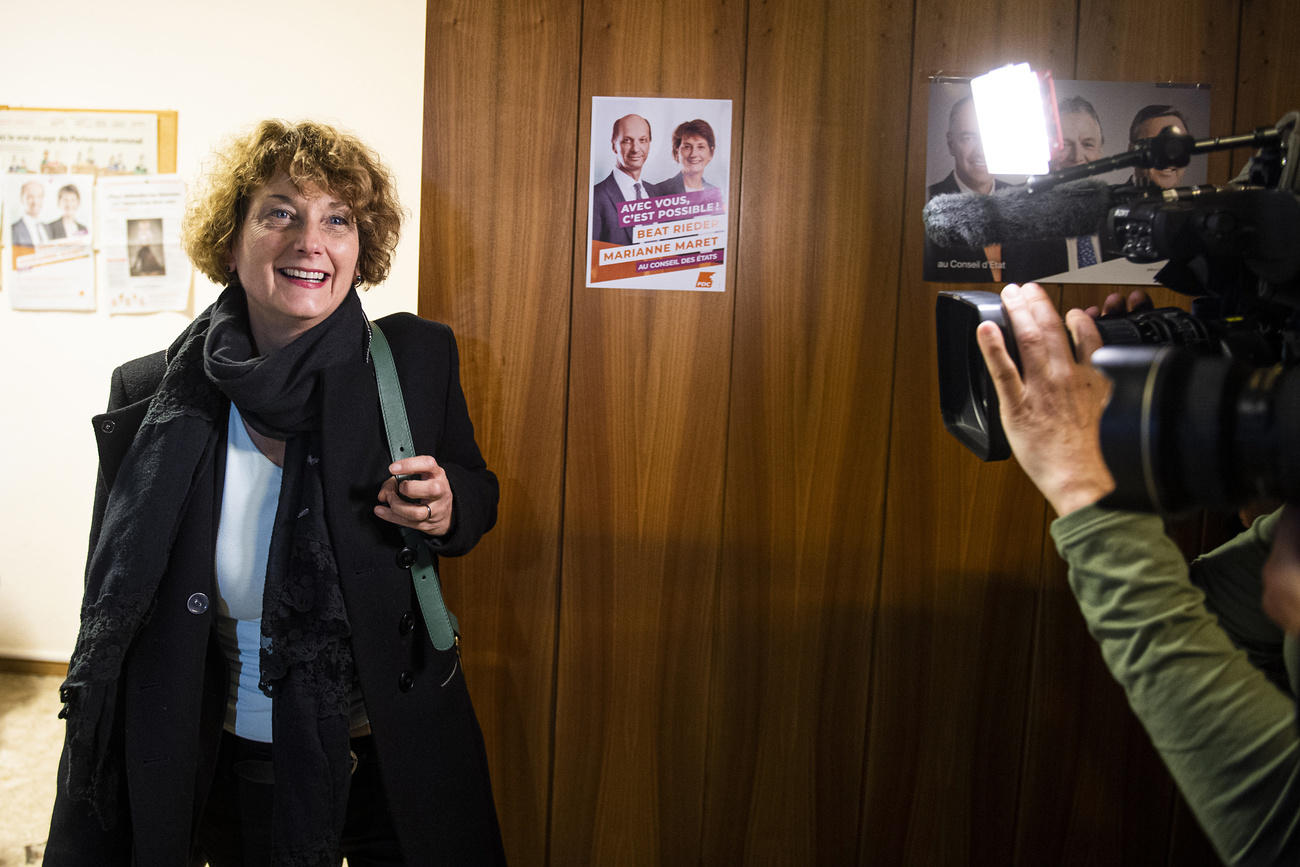A ‘true centrist’ deeply rooted in her region

Marianne Maret is the first woman to represent canton Valais – traditionally a conservative region – in the Swiss Senate. The Christian Democrat chats to swissinfo.ch during a hike along the mountain paths of her Chablais region.
“Both my feet are firmly on the ground, but my head is in the stars,” MaretExternal link says on a walk near her home in Troistorrents, canton Valais. And indeed, the Christian Democrat, recently elected to the Swiss parliament, strides forward with a steady and purposeful gait, both on the mountain trail as well as the campaign trail. But she also knows how to step back and enjoy the beauty of the moment.
“I’m an idealist and will remain so for the rest of my life,” she says. And this despite 22 years of political commitment at a local and regional level under her belt.
Last October, Swiss citizens elected the most female parliament in the country’s history. Although parity has not yet been achieved, women now account for 42% of members of the House of Representatives. To mark the occasion, swissinfo.ch is presenting the profiles of eight newly-elected parliamentarians from different parties.
The politician stops on the so-called Devil’s Bridge and invites us to admire the gorges of the Vièze river. She is deeply attached to her canton.
Since 2013, she has been the president of the Foundation for Sustainable Development in Mountain Regions. In particular, she advocates for greater support for mountain farmers, in order to protect this tradition, to keep jobs in the valleys, and to guarantee biodiversity.
“To maintain stability in Switzerland, we need to keep a certain balance between urban and mountain areas,” she says.
Federalism
The government’s agricultural reform plan exasperated Maret, as all farmers would have had to obtain a compulsory licence – a requirement that would have heavily penalised farms in mountain areas. “The government often proposes regulations that would lead to greater standardisation, whereas this is the opposite of federalism,” she says. “Federalism is a brilliant concept, as it allows for respect for everyone according to their specific characteristics.”
At a bend in the path, Maret stoops for a second to pick up a piece of litter. She carries it in her hand until the next bin, and then throws it in without a second thought. Dedication to her region goes in tandem with her environmental awareness. “Climate change is a reality and we have to do something,” she asserts.

She would approve the CO2 law as currently proposed by the Senate. “However,” she says, “I think that if we increase the fuel tax, we need to envisage ways, for instance a tax correction, to support people living in areas with poor public transport connections and who are forced to use the car”.
‘Hard-working and candid’
Maret seems to know everyone in Troistorrents and says a cheery hallo to all passersby. “She respects people and is a very attentive listener,” says Serge Métrailler, who is the president (until January) of the Christian Democratic Party section in the French-speaking part of canton Valais. He gets on very well with the newly-elected senator, who up to now was the section’s vice-president.

He describes her as a “true centrist”, with great human and political qualities. “She’s a hard-worker who knows her stuff. She stands by her principles; she does what she says and says what she does.”
Marianne Maret made the same impression on the members of the management committee of the Valais cantonal parliament with whom she worked. “She is very professional and lets people get on with their jobs,” says Patrick Hildbrand, cantonal parliamentarian for the Swiss People’s Party. “She is very candid and can be very tough in discussions, but she always remains calm and respectful.”
Not sunk in properly
On a forest path carpeted with dead leaves, we ask Maret how she feels about serving in the Senate. “It hasn’t sunk in properly yet,” she says after a few seconds’ silence.
She was elected on November 3 in a run-off ballot, some 1,370 votes ahead of her main rival, the Social Democrat Mathias Reynard. She thus consolidated the dominance of the Christian Democratic Party in the Senate: the party has occupied the two senatorial seats assigned to Valais for over 160 years. At the same time, she is the first woman from the canton to enter the Senate.

Swiss nationals living abroad cannot elect senators in Valais canton. Maret had no particular contacts with the expatriate Swiss community during her campaign, but she remembers those expatriates who used to vote systematically when she was the president of a municipality: “It’s amazing, this allegiance that endures.”
She supports the development of a new electronic voting system, “but we cannot launch this project until data security is guaranteed. We’ll have peace of mind only once we totally trust the system.”
Equal pay and old age pension
One of the main tasks at hand for the new parliament is reforming the old-age insurance system. Unlike her party, Maret is against raising the retirement age for women as long as there is still a wage gap.
“I have a problem with demanding retirement at 65 for all in the name of equality, while inequalities persist at another level. Especially as equal pay would help replenish old-age insurance funds,” she says.
Our hike is coming to an end. On the final stretch, we admire the view of the village of Troistorrents and the valley floor. A good opportunity to ask Maret about her position on paternity leave. She is pragmatic: “I am in favour of the two weeks. It is true that it is not a cure-all, but we will try it out from an economic point of view, and then move on to a higher level.”
Maret was sworn in to the Senate on December 2, where she will sit for a four-year term. “She knows the Valais and has a lot of experience,” stresses Hildbrand. “She’s the ideal person to defend the interests of the region and win people over.”
– 1997: elected to the municipal council (executive) of Troistorrents, Valais
– 2005-2012: president of the municipality of Troistorrents
– 2009-2013: president of the federation of Valais municipalities
– 2009-2019: Member of the Valais cantonal parliament
– Since 2014: vice-president of the Christian Democratic Party in French-speaking Valais
– 2019: elected to the Senate
Adapted from French by Julia Bassam/urs

In compliance with the JTI standards
More: SWI swissinfo.ch certified by the Journalism Trust Initiative













You can find an overview of ongoing debates with our journalists here . Please join us!
If you want to start a conversation about a topic raised in this article or want to report factual errors, email us at english@swissinfo.ch.